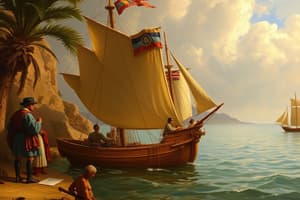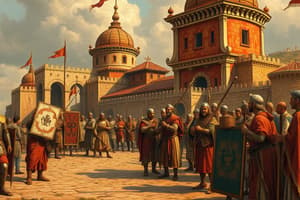Podcast
Questions and Answers
Who founded Manilla in the name of his majesty?
Who founded Manilla in the name of his majesty?
- Miguel Lopez de Legaspi (correct)
- Juan de Sauzedo
- Martin de Goiti
- Ferdinand Magellan
Which expedition arrived in the archipelago and named it Las Phelipinas?
Which expedition arrived in the archipelago and named it Las Phelipinas?
- Columbus Expedition
- Villalobos Expedition (correct)
- Magellan Expedition
- Legazpi Expedition
What type of structure was the fort made of in Manilla?
What type of structure was the fort made of in Manilla?
- Mud and straw
- Wood and palm trees (correct)
- Stone and brick
- Metal and concrete
In what year was Manila taken by Spanish and Visayan forces?
In what year was Manila taken by Spanish and Visayan forces?
What was the role of 'the master of camp' during the occupation of Manilla?
What was the role of 'the master of camp' during the occupation of Manilla?
What significant date had artillery fired at two ships moored near the fort?
What significant date had artillery fired at two ships moored near the fort?
What was Ferdinand Magellan's objective in his expedition?
What was Ferdinand Magellan's objective in his expedition?
Which chieftain was suspected to lack good faith during negotiations?
Which chieftain was suspected to lack good faith during negotiations?
What economic motive propelled the exploration during the 15th and 16th centuries?
What economic motive propelled the exploration during the 15th and 16th centuries?
What event in 1453 significantly affected trade routes to the East?
What event in 1453 significantly affected trade routes to the East?
Which Portuguese figure established a navigational school that advanced exploration efforts?
Which Portuguese figure established a navigational school that advanced exploration efforts?
What was a key religious motive behind the exploration efforts of Spain and Portugal?
What was a key religious motive behind the exploration efforts of Spain and Portugal?
In what year did Vasco da Gama successfully reach India?
In what year did Vasco da Gama successfully reach India?
What significant event occurred in 1492 related to exploration?
What significant event occurred in 1492 related to exploration?
Which port was captured by the Portuguese in 1511, enhancing their control of Southeast Asia?
Which port was captured by the Portuguese in 1511, enhancing their control of Southeast Asia?
What misconception did Christopher Columbus have about the lands he encountered?
What misconception did Christopher Columbus have about the lands he encountered?
Who led the expedition that named the islands Las Phelipinas?
Who led the expedition that named the islands Las Phelipinas?
What significant act did Miguel Lopez de Legazpi perform in the Visayas Islands?
What significant act did Miguel Lopez de Legazpi perform in the Visayas Islands?
Which artist painted the portrait of King Philip II in 1550?
Which artist painted the portrait of King Philip II in 1550?
What was the capital of the new colony established by Legazpi in 1571?
What was the capital of the new colony established by Legazpi in 1571?
What title did Manila receive from Spain?
What title did Manila receive from Spain?
Who was the first king mentioned in the content?
Who was the first king mentioned in the content?
What significant event occurred on April 26?
What significant event occurred on April 26?
What was the primary purpose of Magellan's expedition?
What was the primary purpose of Magellan's expedition?
Who was the chief that refused to obey the king of Spain?
Who was the chief that refused to obey the king of Spain?
How many boatloads of men did the captain-general decide to take to Mactan?
How many boatloads of men did the captain-general decide to take to Mactan?
What was the name of the only ship that returned safely from the expedition?
What was the name of the only ship that returned safely from the expedition?
What material was used to make the shields described in the content?
What material was used to make the shields described in the content?
Who continued the expedition after Magellan's death?
Who continued the expedition after Magellan's death?
What was one of the main objectives of Ferdinand Magellan's voyage?
What was one of the main objectives of Ferdinand Magellan's voyage?
Which island was first encountered by Magellan's fleet on March 16, 1521?
Which island was first encountered by Magellan's fleet on March 16, 1521?
How long did Magellan's fleet spend at sea before encountering Samar?
How long did Magellan's fleet spend at sea before encountering Samar?
What did the crew of Magellan's ship provide as gifts to the Captain General?
What did the crew of Magellan's ship provide as gifts to the Captain General?
What significant event marked the first recorded mass in Philippine history?
What significant event marked the first recorded mass in Philippine history?
Which of these items was NOT mentioned as merchandise shown by the Captain General?
Which of these items was NOT mentioned as merchandise shown by the Captain General?
What term describes the transformation of the Philippine population during Spanish rule?
What term describes the transformation of the Philippine population during Spanish rule?
What was the primary religion introduced to the Philippines during Spanish rule?
What was the primary religion introduced to the Philippines during Spanish rule?
Flashcards are hidden until you start studying
Study Notes
15th and 16th Century Exploration and Expansion
- European exploration and expansion were driven by economic motives, particularly access to profitable Oriental trade routes for goods like silk and spices.
- The fall of Constantinople in 1453 to the Ottomans disrupted established trade routes, leading to a monopoly by Muslim traders and the Italian city-state of Venice.
- European monarchs and merchants sought alternative routes to the East, fueled by scientific and technological advancements in shipbuilding, cartography, and navigation.
Prince Henry the Navigator
- Established a navigational school in Portugal, gathering scholars and sailors to advance exploration.
Religious Motives
- European exploration had a religious dimension, driven by the desire to spread Christianity.
- Spain and Portugal, influenced by the Reconquista against the Moors, sought to convert the populations of Asia and Africa.
Portuguese Exploration
- Portuguese sailors explored the west coast of Africa, culminating in Vasco da Gama's successful voyage to India in 1498, rounding the Cape of Good Hope.
- In 1511, the Portuguese captured the strategic port of Malacca in Southeast Asia.
Christopher Columbus and the Americas
- Columbus, believing he could reach the East by sailing west, stumbled upon the Americas in 1492.
- Mistaking the indigenous people for Indians, he believed he had landed in Asia.
The Spanish Conquest of Manila
- Manila, a village in the Philippines, had a large harbor and was strategically located.
- Spanish forces, led by Miguel Lopez de Legazpi, arrived in 1571, capturing the village and establishing it as the capital of the colony.
- The Spanish victory was hard-fought, with fierce resistance from the indigenous inhabitants.
- Prior to the Spanish conquest, Manila was claimed to have a population of 80,000, including 2,000 in the town itself.
Ferdinand Magellan and the First Voyage around the World
- Portuguese sailor Ferdinand Magellan, seeking a western route to the East, arrived in the Philippines in 1521 after sailing through the Pacific Ocean.
- Magellan's expedition, chronicled by Antonio Pigafetta, comprised five ships and around 250 men.
- After landing in Samar, Magellan's ships encountered the indigenous population, exchanging goods and attempting to establish alliances.
- Magellan was killed during a battle with the inhabitants of Mactan on April 26, 1521.
- Despite Magellan's death, the expedition continued, with Sebastian del Cano completing the first circumnavigation of the world in 1522.
Spanish Colonization of the Philippines
- The Philippines remained under Spanish rule for over three centuries.
- The Spanish established their capital in Manila and introduced Catholicism, suppressing traditional pagan practices.
Spanish Monarchs Involved
- King Philip II of Spain, one of the most powerful European monarchs of his time, decided to colonize the Philippines after relinquishing his claim to the Moluccas to Portugal.
- An expedition led by Miguel Lopez de Legazpi, departing from Mexico in 1564, arrived in the Philippines in 1565 and established Spanish rule.
- Legazpi played a crucial role in establishing Spanish dominance in the archipelago.
- Legazpi's expedition included De Goiti, who discovered the port and town of Manila.
- The Spanish capital in the Philippines was named Muy Insigney Siempre Leal Cuentad (Eminent and Ever Loyal City) by Spain.
Manila and the Heart of Spanish Power
- Manila became the center of Spanish colonial power in the Philippines, expanding its influence throughout the archipelago.
- Luzon, a large and populous island in the Philippines, served as a key region for Spanish colonial interests.
Studying That Suits You
Use AI to generate personalized quizzes and flashcards to suit your learning preferences.




